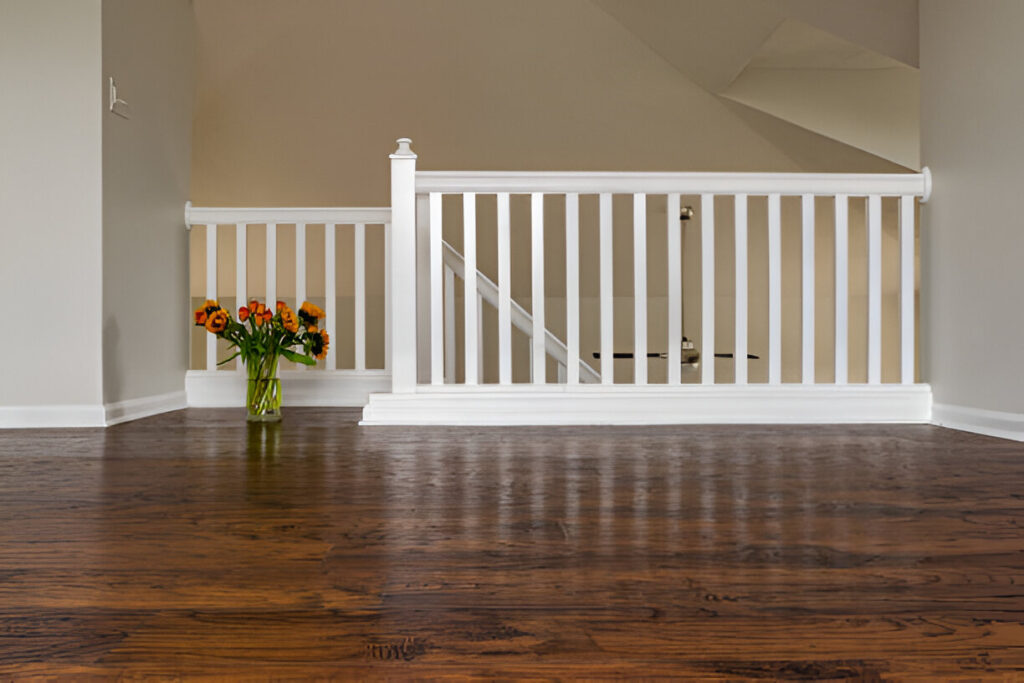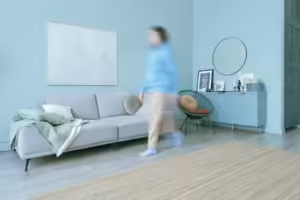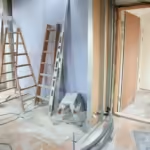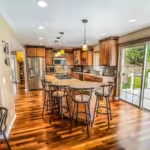Luxury Vinyl Plank (LVP) is a high-quality synthetic flooring option that closely mimics the look of hardwood or stone. It’s composed of multiple layers, including a protective wear layer, a decorative image layer, a resilient core layer, and a backing layer. This structure makes LVP highly durable, water-resistant, and low maintenance. As a result, it’s ideal for areas prone to moisture or heavy foot traffic, such as kitchens, bathrooms, and basements.
In recent years, LVP has gained popularity due to its ability to replicate high-end materials at a lower price point. It provides homeowners with the beauty of hardwood without the associated cost and maintenance, making it a practical choice for those on a budget. The variety of styles and finishes available further enhances its appeal, allowing homeowners to choose designs that seamlessly match their decor.
Comparing LVP to Traditional Flooring: Which Adds More Value?
When evaluating flooring options to enhance home value, many consider traditional materials like hardwood, tile, or laminate. Here’s a quick comparison to understand how LVP measures up:
1. Cost: Hardwood flooring typically ranges from $5 to $10 per square foot, while LVP costs between $2 and $5. This price difference makes LVP a budget-friendly option, allowing homeowners to upgrade their floors without breaking the bank.
2. Aesthetic Appeal: While hardwood is often seen as the gold standard for home value, high-quality LVP can look nearly identical. Its realistic finishes and textures can create a luxurious appearance at a fraction of the cost.
3. Durability: LVP is more resistant to water, scratches, and dents compared to traditional hardwood, making it an excellent choice for families with children or pets. It can also withstand humidity and temperature changes better than hardwood, which can expand or contract.
4. Maintenance: Unlike hardwood, which requires regular refinishing and polishing, LVP is virtually maintenance-free. A simple cleaning routine keeps it looking new for years, adding convenience for busy homeowners.
How LVP Can Increase Home Value
Installing LVP flooring can positively impact a home’s value in several ways:
1. Improved Aesthetic Appeal: Modern LVP options come in a wide range of colors and finishes, enabling homeowners to create a cohesive look throughout their home. This versatility can make spaces appear larger and more refined, boosting a home’s overall appeal.
2. High ROI: The return on investment (ROI) for LVP is solid, typically offering 70-80% of the project’s cost. While hardwood may provide a slightly higher ROI, LVP’s affordability and durability make it a strong contender, especially for cost-conscious homeowners.
3. Attracting Potential Buyers: Homes with updated, stylish flooring often attract more interest from buyers. LVP’s low maintenance and long lifespan are also selling points, as buyers see it as a durable option that doesn’t require immediate replacement or repairs.
4. Ease of Installation: LVP is easier and quicker to install than other flooring options. For DIY-savvy homeowners, this can be a big plus, as it reduces labor costs and time.
Where to Use LVP for Maximum Impact
To maximize the value added by LVP flooring, it’s crucial to choose the right rooms for installation. LVP works best in:
- Kitchens: LVP’s water resistance makes it a great choice for kitchens, where spills and moisture are common.
- Bathrooms: The waterproof nature of LVP ensures it holds up well in high-humidity environments.
- Basements: LVP’s resistance to mold and mildew growth makes it ideal for basements, which are often prone to dampness.
- Living Areas: Its wood-like appearance can bring warmth and elegance to living rooms, bedrooms, and dining areas.
Potential Drawbacks of LVP
Although LVP is a versatile and practical flooring option, it does come with some drawbacks:
Perceived Value: While LVP can look like hardwood, some buyers still perceive it as a cheaper alternative. For high-end homes or luxury properties, real hardwood or natural stone might be a better option to meet buyer expectations.
Resale Considerations: In some markets, traditional flooring options like hardwood or tile are preferred. Depending on the buyer demographic, opting for LVP over these may not always provide the desired boost in value.
Expert Opinions on LVP and Home Value
Many real estate agents and contractors agree that LVP is no longer seen as a budget-only option. Its modern designs and durability have elevated its status, making it a viable choice for increasing home value.
“LVP is a fantastic choice for homeowners who want to upgrade their floors without a major investment,” says John Anderson, a real estate agent with over 15 years of experience. “It’s durable, beautiful, and appeals to a wide range of buyers. I’ve seen homes with LVP sell faster because of its practicality and visual appeal.”
Best Practices for Using LVP to Improve Your Home’s Value
To get the most value out of LVP, follow these best practices:
- Opt for High-Quality Products: High-end LVP closely resembles real wood or stone and offers better durability.
- Use Professional Installation: Proper installation ensures a seamless finish and prevents potential issues like lifting or buckling.
- Match the Style to the Market: Choose neutral colors and classic patterns that appeal to a broad audience. This can make your home more attractive to prospective buyers.
The Final Verdict: Does LVP Improve a Home’s Value?
So, does LVP improve a home’s value? The answer is yes, especially when installed strategically and in the right locations. LVP’s affordability, low maintenance, and aesthetic appeal make it a solid option for most homeowners. While it may not reach the value-boosting potential of hardwood in high-end markets, it’s an excellent choice for average homes looking to modernize and increase their appeal.








